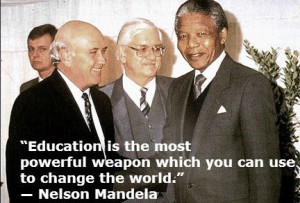 The topic that has dominated discourse across the globe in recent days has been the passing of Nelson Mandela at age 95. He was a true giant among personalities in the past century, and his passing has had a phenomenal global response.
The topic that has dominated discourse across the globe in recent days has been the passing of Nelson Mandela at age 95. He was a true giant among personalities in the past century, and his passing has had a phenomenal global response.
Out of respect, our school flags were lowered when we learned of Mandela’s death. Canada was a major supporter of Mandela and the ANC’s (Africa National Congress) quest for racial justice. Under different Canadian prime ministers we openly renounced the policy of Apartheid. While Mandela was imprisoned, a host of diplomatic initiatives were carried out, and we boycotted all South African products in an open effort to isolate and strangle the sustainability of the white-only government. After his release from prison in 1990, the first country Mandela visited was Canada. He was also named an honourary Canadian citizen. Interestingly, Mandela was a Patron of the Round Square and a supporter of the active learning and globalism that this association of schools embodies.
For inspiration I continue to turn to the life story of Nelson Mandela and his relentless struggle against the demeaning injustices of decades of apartheid in his country. After his release from 27 years in prison and eventual rise to the top political office in South Africa, we all learned from Mandela about the incredible power of forgiveness. Once free, with the snap of a finger, Mandela could have insisted on armed revolt to overwhelm the two million white South Africans whose governments had violently subjugated the black majority for decades. Mandela did not seek revenge; instead he sought reconciliation and forgiveness as the foundation for a new South Africa‑–a multicultural country he labeled the “Rainbow nation”.
Mandela insisted on peace, telling his followers that not a drop of blood should be shed. While in prison he took the extraordinary step of learning the language of his oppressors, the white Afrikaans. Once elected president, he immediately hired a white executive assistant, and out of respect, spoke to her mostly in Afrikaans.
So many had suffered under the violence of apartheid regimes. Mandela realized he needed to find a way to heal wounds that were generations deep. Most said it was impossible. He quickly established something called the Truth and Reconciliation Commission‑–a place where former state police would confess their vicious sins after decades of conflict in the South Africa of apartheid, a word and a philosophy that literally meant “Apartness.” Those who confessed were assured in advance that they would not be imprisoned. But for Mandela, allowing the truth to emerge was better than allowing the truth to remain buried forever. This was part of the long road to healing a nation that he envisioned for his citizens. As one can imagine, it was very difficult for families to hear the stories of how the secret police conducted their vile business. But Mandela convinced his people to accept this process as the best bridge that could be built to a new multiracial, peaceful, democratic South Africa. Forgiveness personified. The chairperson of the commission, the venerable Archbishop Desmond Tutu, underscored the miracle of hope as the foundation for South Africa’s renewal process. In those early days after Mandela took power as the first black president in South Africa, Archbishop Tutu said, “I hope I’m a prisoner of hope. However dark the past, it cannot overwhelm the light of the dawn of the future.”
In addition to forgiveness and the building blocks of peace, Mandela believed that the key to a prosperous South Africa would be education. I keep a card at my desk with a quote by Mandela: “Education is the greatest engine of personal development.” It’s on card I bought in Cape Town immediately after visiting Robben Island where he was imprisoned for more than 25 years. I stood in his former cell, saw where he broke rock in the searing sun, and was inspired by his capacity to overcome such suffering and neutralize a quest for revenge in himself and his people.
To begin the official remembrance ceremonies for Mandela within South Africa, close to 100-thousand people gathered in a Soweto soccer stadium to celebrate his life. Among them were many heads of state, including four Canadian prime ministers.
Mandela has taught us all about the magical power of forgiveness and reconciliation with our opponents. Our challenge is to implement just a fraction of what Mandela modeled in life. However, if we are to truly honour Mandela, I assert it is beyond that, it is our duty. —Christopher Shannon, Headmaster
